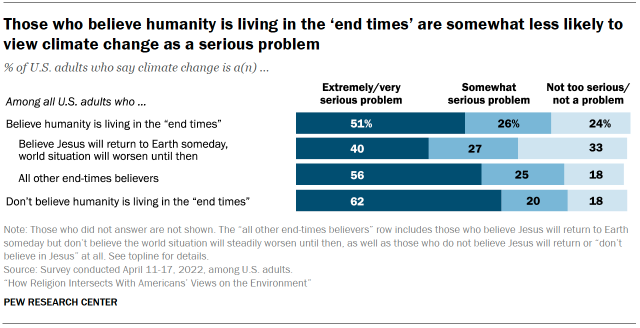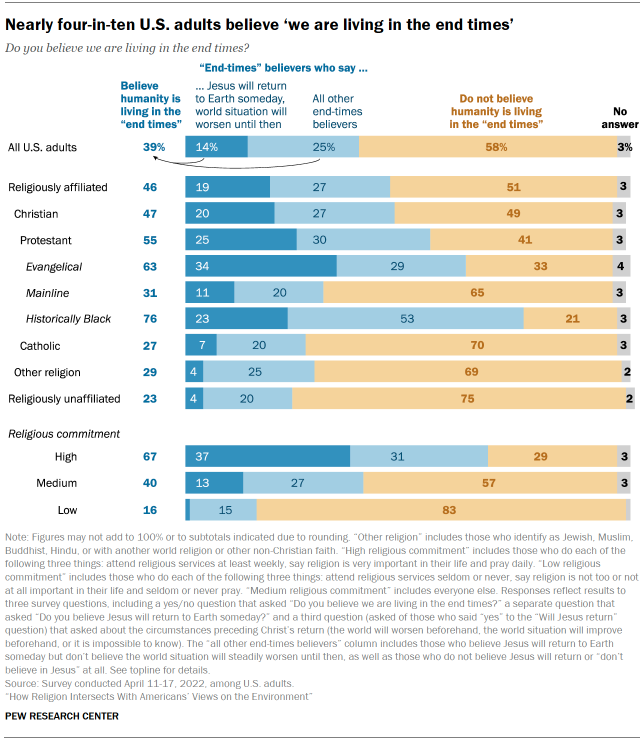Thirty-nine percent of U.S. citizens believe that we are living in the end times, a survey has found.
These results come from a Pew Research Center survey of 10,156 adults on the Center's American Trends Panel that was conducted in April 2022 titled "How Religion Intersects With Americans' Views on the Environment."
The belief in the end times appears to span many religions, with 47 percent of Christians surveyed saying humanity is in its last days.

Climate Change vs. the Apocalypse
The survey also found that those who believe that the "end times" are here did not necessarily consider climate change to be a pressing issue. Those who think we are living in the end times are less likely to say climate change is an extremely or very serious problem (51 percent) than those who do not believe this (62 percent).
Of the Christians who believe we are in the end times, a small group express what the Pew Research Center defines as a "premillennialist" point of view, saying that Jesus Christ will return to Earth someday and that the world will deteriorate until then. Some 40 percent of respondents from this group of people feel that climate change is "extremely or very serious."
"Americans' attitudes about climate change are sometimes said to be linked to beliefs about the apocalypse or 'end times.' As the theory goes, people who believe humanity is living in its last days may be less concerned about the dangers of climate change than those who do not think the world is soon coming to an end," Becka Alper, a senior researcher at Pew Research Center, told Newsweek.
Climate change is indisputably the result of human actions on the planet, with the burning of fossil fuels and greenhouse gas emissions as well as the release of other pollutants and deforestation having already caused a worldwide temperature increase of about 1° Celsius (nearly 2° Fahrenheit) since 1880, according to scientists from the Intergovernmental Panel on Climate Change. This is forecasted to increase by a further 4° C (7.2° F) before 2100 if greenhouse gas levels continue to rise at their current rates. Climate change has already led to increases in extreme weather events across the globe.
"Climate change is here, and it's time to stop fiddling," Matthew Casale, Environment Campaigns Director at nonprofit group Public Interest Research Group (PIRG), previously told Newsweek."Our planet is hotter, our forests are burning, and we're losing more lives and homes every year. The overwhelming scientific consensus is that this dangerous rise in global temperatures is caused by human activity, primarily from burning fossil fuels."
"Some scholars have theorized that public attitudes toward the environment may be tied, at least in part, to beliefs about the 'end times'—such as the belief that the end of the world and the arrival of a messiah (or the 'second coming' of Jesus) is imminent," Alper said. "For example, if one believes that the world is about to end, protecting the environment for the long term may not seem as important."
What Are the End Times and Who Believes in Them?
The end times refer to a broad range of events that represent the end of the world, the apocalypse, or doomsday, often as part of some God-driven eschaton. Many religions have an "end times" in their scripture, usually as an event where the world is destroyed to cleanse mankind from sin—or sinners—and the worthy are redeemed. The exact itinerary of the apocalypse varies from religion to religion but is believed across Judaism, Islam, Norse myth and several subsets of Christianity including Jehovah's Witnesses, Seventh-day Adventists and Mormons.
The survey did not define the end times for respondents, however.
"When people answered this question, they could have been thinking about a range of things they may associate with it; some respondents may have been thinking about the end times in supernatural terms, but others might have been thinking in strictly natural terms. Some may have been thinking about the end times as described in their scripture, others may have been thinking about other things, such as extreme weather events or the pandemic," Alper said.
Additionally, while the survey appears to indicate that people unaffiliated with a religion also believe in the end times, the meaning of that event was open to interpretation.
"However they understood the question, the overwhelming majority of atheists do not believe we are living in the end times, while 9 percent say they believe we are," Alper said.
Is the Belief We Are Living in End Times Increasing?
The belief in the end times existing now does not appear to be increasing. The AdventistToday reported in 2013 that 41 percent of all United States adults believed the world is now living in the "end times" described in the Bible, while one 2016 poll conducted by the Yale Program on Climate Change Communication found that 11 percent of people thought that since the end times are coming, we didn't need to worry about climate change.
The latest Pew survey did find that 76 percent of adherents of the historically Black Protestant tradition and 63 percent of evangelical Protestants said they believe humanity is living in the end times.
Despite these beliefs that the world may be coming to an end, the Pew survey also found that 80 percent of religious Americans identified with the notion of stewardship, or the statement "God gave humans a duty to protect and care for the Earth, including the plants and animals."
Additionally, an April 2021 Pew survey found that nearly half of Americans say they make efforts to reduce their carbon footprint, with 81 percent reducing their daily food waste and two-thirds reducing their daily water usage.
References
How Religion Intersects With Americans' Views on the Environment. Becka A. Alper. Pew Research Center (2022).
Uncommon Knowledge
Newsweek is committed to challenging conventional wisdom and finding connections in the search for common ground.
Newsweek is committed to challenging conventional wisdom and finding connections in the search for common ground.
About the writer
Jess Thomson is a Newsweek Science Reporter based in London UK. Her focus is reporting on science, technology and healthcare. ... Read more
To read how Newsweek uses AI as a newsroom tool, Click here.







